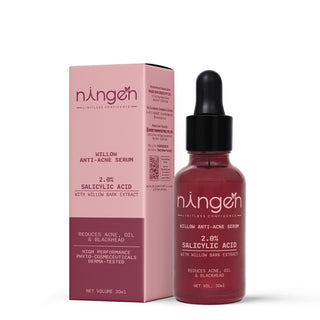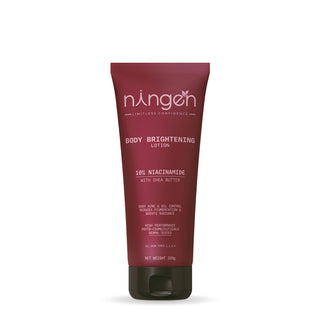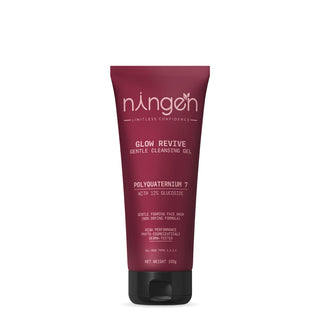TLDR;
Finding the best moisturizer for oily skin is crucial to maintaining a balanced, healthy complexion. Oily skin, caused by overactive sebaceous glands, often results in a shiny appearance and larger pores. Key ingredients like Hyaluronic acid, Aloe Vera, Salicylic acid, and Niacinamide can help manage oil production and prevent breakouts. Look for lightweight, non-comedogenic, and oil-free products to keep your skin hydrated without adding extra shine. Follow a consistent skincare routine that includes gentle cleansing, toning, and moisturizing to keep your skin happy and glowing.
Hey there, oily-skin fighters! We understand the struggle of finding the ideal moisturizer for oily skin. One moment, your face is a shiny mess, and the next, it feels parched from over-cleansing. But don't worry, we’re here to help! Skipping moisturizer isn’t the solution; the key is to know which moisturizer is best for your oily skin. You deserve hydration without the greasy shine. If you are tired of dealing with midday slickness and want a fresh-faced glow, you’re in the right place. In this article, we’ll explore the best moisturizers tailored specifically for oily skin, ensuring your complexion stays happy and balanced throughout the day. So, let’s embark on this journey to find your perfect match!
In This Article;
Oily Skin: What You Should Know
Is Moisturizing Necessary for Oily Skin?
Which Moisturizer is Best for Your Oily Skin?
Oily Skin: What You Should Know
Oily skin occurs when your sebaceous glands produce excessive sebum, resulting in a shiny and greasy appearance on your face. This can also lead to larger pores and a thicker skin texture. While sebum is important for keeping your skin healthy and protecting its barrier, too much of it can leave you looking constantly oily. Oily skin is different from combination skin, where only the T-zone (forehead, nose, and chin) is oily, and other areas of the face can be normal or dry.
Causes of Oily Skin
Oily skin can be caused by many factors, like genetics, hormones, diet, and the environment. It can run in families or get worse during puberty, pregnancy, or due to conditions like PCOS. Hot, humid weather and using the wrong skincare products can also make your skin produce more oil.
Common Concerns for Oily Skin
Individuals with oily skin often face unique challenges. Acne breakouts are common due to clogged pores, and products to reduce oiliness can sometimes be too harsh, leading to sensitive skin. Issues like uneven tone, dullness, and maintaining hydration without increasing oil production are also critical. Balancing oil removal while preserving the skin barrier is a constant struggle.
Is Moisturizing Necessary for Oily Skin?
Yes, moisturizing is necessary for oily skin, and skipping this crucial step can actually make your skin produce even more oil.
Here's what many people don't realize: oily skin and dehydrated skin aren't mutually exclusive. Your skin can be simultaneously oily and lacking in hydration. When you strip your skin of moisture by skipping moisturizer or using harsh, drying products, your skin goes into overdrive mode. It responds by producing even more sebum (oil) to compensate for the lack of hydration, creating a frustrating cycle.
Think of it this way. Oil and water serve different purposes for your skin. Oil creates a barrier, while water provides actual hydration to your skin cells. The best moisturizer for oily skin will provide that essential hydration without adding excess oil or clogging your pores.
What Happens When You Skip Moisturizer?
When people with oily skin avoid moisturizing, several problems can develop:
-
Increased oil production: Your skin overcompensates for the lack of moisture by ramping up sebum production
-
Compromised skin barrier: Without proper hydration, your skin's protective barrier weakens, making it more susceptible to irritation and breakouts
-
Dehydration lines: Even oily skin can develop fine lines and texture issues when it's dehydrated
-
Makeup application issues: Products won't sit well on dehydrated skin, often looking patchy or separating throughout the day
The Right Approach to Moisturizing Oily Skin
The key isn't to avoid moisturizer, it's to choose the right one. The best moisturizer for oily skin should have these characteristics:
Lightweight texture: Look for gel-based, water-based, or oil-free formulas that absorb quickly without leaving a greasy residue.
Non-comedogenic ingredients: Choose products labeled "non-comedogenic," meaning they won't clog your pores or contribute to breakouts.
Mattifying properties: Some moisturizers contain ingredients that help control shine while still providing hydration.
Hydrating without heaviness: Ingredients like hyaluronic acid, glycerin, and niacinamide provide excellent hydration without adding oil.
Also read: When to use an oil-free moisturizer.
Which Moisturizer is Best for Your Oily Skin?
Finding the best moisturizer for oily skin isn't about chasing expensive brands or trendy products; it's about understanding which ingredients work specifically for oil-prone skin. The right formulation can provide essential hydration while controlling shine, minimizing pores, and preventing breakouts.
Here are the key ingredients to look for when choosing the best moisturizer for oily skin, along with why they're so effective:
Essential Hydrating Ingredients
-
Hyaluronic Acid: This powerhouse ingredient provides lightweight, deep hydration by attracting and holding up to 1,000 times its weight in water. It delivers moisture directly to your skin cells without adding any oil or creating a greasy feel, making it ideal for keeping oily skin plump and hydrated without heaviness.
-
Glycerin: As a humectant, glycerin draws moisture from the environment into your skin and helps lock it in. It keeps your skin hydrated throughout the day without any greasy residue, making it a staple ingredient in the best moisturizer for oily skin formulations.
-
Aloe Vera: This natural ingredient soothes and hydrates the skin while providing powerful anti-inflammatory benefits. It's particularly beneficial for oily skin that's also prone to irritation or redness, offering a calming effect without adding excess oil.

Oil-Controlling and Balancing Ingredients
-
Niacinamide (Vitamin B3): One of the most effective ingredients for oily skin, niacinamide regulates sebum production at the source, helping to reduce excess oil over time. It also reduces inflammation, minimizes the appearance of pores, and improves overall skin texture – making it a multi-tasking hero ingredient.
-
Lightweight Oils (such as Jojoba Oil): While it may seem counterintuitive, certain lightweight oils can actually help balance oily skin. Jojoba oil closely mimics your skin's natural sebum, which signals to your skin that it doesn't need to produce as much oil, helping to normalize oil production.
-
Green Tea Extract: Rich in antioxidants, green tea extract helps reduce inflammation and controls excess oil production. It also protects your skin from environmental damage while providing a mattifying effect that keeps shine at bay.
Pore-Clearing and Exfoliating Ingredients
-
Salicylic Acid: This beta-hydroxy acid (BHA) penetrates deep into pores to exfoliate from within, clearing out clogged pores and reducing the likelihood of acne breakouts. It's oil-soluble, making it particularly effective for oily, acne-prone skin types.
-
Lactic Acid: This gentle alpha-hydroxy acid (AHA) exfoliates the skin's surface while simultaneously providing hydration. It promotes a smoother, more refined texture and helps prevent the buildup of dead skin cells that can lead to clogged pores.
-
Willow Bark Extract: A natural source of salicylic acid, willow bark extract offers gentle exfoliation and helps unclog pores without irritation. It's an excellent option for those who want the benefits of salicylic acid in a more natural, soothing form.
Acne-Fighting and Antibacterial Ingredients
-
Tea Tree Oil: Known for its powerful antibacterial and antimicrobial properties, tea tree oil helps control excess oil production while preventing acne-causing bacteria from thriving on your skin. It's particularly beneficial for those dealing with both oiliness and breakouts.
The Bottom Line
Thank you for reading our article Which Moisturizer is Best for Your Oily Skin. Managing oily skin doesn’t have to be a daunting task. With the right moisturizer and a consistent skincare routine, you can control excess oil, prevent breakouts, and achieve a balanced, healthy complexion. Remember, hydration is key, even for oily skin. Look for lightweight, non-comedogenic products that keep your skin hydrated without adding extra shine. By incorporating beneficial ingredients like hyaluronic acid, salicylic acid, and niacinamide, you can tackle common oily skin concerns effectively. Stay diligent with your routine, and your skin will thank you with a fresh, glowing appearance every day. So, embrace the journey to finding your perfect moisturizer and enjoy the confidence that comes with well-cared-for skin!
“Hydrate, don't hesitate, even oily skin needs love!"
Frequently Asked Questions
Q1: What Causes Oily skin?
Oily Skin is primarily caused due to overly active sebaceous glands that produce excess sebum, often impacted by various factors, including influences hormonal changes, dietary habits, and environmental conditions.
Q2: Which ingredients should I seek in a moisturizer for oily skin?
You should seek ingredients such as hyaluronic acid, salicylic acid, niacinamide, glycerin, aloe vera, tea tree oil, lightweight oils, green tea extract, lactic acid, and willow bark extract while buying a moisturizer for oily skin.</span>
Q3: Which moisturizer is best for oily skin type?
Lightweight, gel-based, or water-based moisturizers that are both oil-free and non-comedogenic are the best moisturizers for oily skin type.
Q4: Can oily skin experience dehydration?
Indeed, oily skin can become dehydrated, which may result in increased oil production as a protective response.
Q5: How can I balance oil production in my skincare routine?
Incorporate products containing niacinamide and lightweight oils such as jojoba to help regulate the production of sebum.
Q6: How frequently should I exfoliate oily skin?
Exfoliate 2-3 times a week using chemical exfoliants, such as salicylic acid or glycolic acid, to clear pores and reduce the risk of breakouts.
References & further studies:
- American Academy of Dermatology (AAD) – Understanding oily skin and skincare tips 👉 https://www.aad.org/public/everyday-care/skin-care-basics/dry/oily-skin
- Healthline – How to choose the right moisturizer for oily skin 👉 https://www.healthline.com/health/beauty-skin-care/best-moisturizer-for-oily-skin
- Cleveland Clinic – Causes and management of oily skin 👉 https://health.clevelandclinic.org/oily-skin-causes-and-treatment
- WebMD – The science behind sebum and acne 👉 https://www.webmd.com/beauty/ss/slideshow-oily-skin-care












